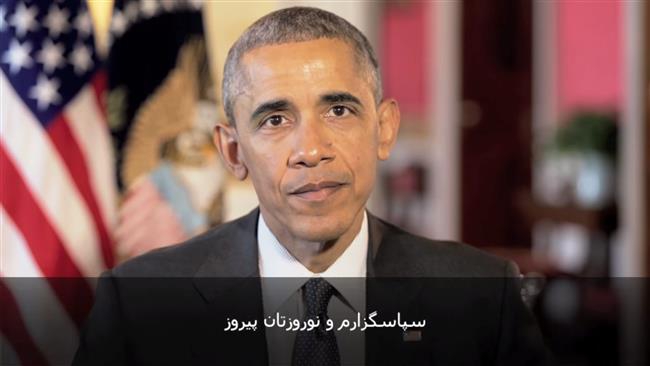We recognize Irans right to peaceful nuclear energy consistent with Irans nuclear obligations, Obama said in the video message posted on Saturday, in reference to the nuclear deal between Iran and the global powers.
Based on it, Iran agreed to restrict certain aspects of its nuclear energy in return for the removal of certain economic sanctions.

The US president said Irans commitment to the Joint Comprehensive Plan of Action (JCPOA), means Tehran wants to assure the world that its nuclear program is and will remain for peaceful purposes.
Mutual respect
Obama also spoke about how we might open a new window and begin a new relationship between our countries.
Now for the first time in decades, theres a chance for a different future. Over the years, you have heard me say that the United States was prepared to engage with Iran in a state of mutual interest and mutual respect. Well, thats exactly what we did, said the US president. In the last few years, our diplomats and nuclear scientists sat down together and negotiated face to face. And last summer, along with our international partners, we reached the historic deal on Irans nuclear program.
On the other hand, Obama also referred to profound differences between the two countries, noting that last Julys agreement was never intended to resolve all the disputes between our two nations.
He, however, expressed hope, saying, The fact that we are now talking to each other on a regular basis for the first time in decades, gives us an opportunity, a window, to resolve other issues.
Nowruz in White House
Obama sounded optimistic about a boost in trade after the deal, saying, Americans are eager to buy more of your beautiful Persian carpets, caviar, pistachios and saffron.
Apart from that, his message to congratulate Nowruz 1395 to anyone celebrating it across the United States and around the world, contained more Persian words and elements compared to previous years.
And once again well be celebrating Nowruz at the White House as well, he said, mentioning Sabzi polo with fish, a Persian dish of rice and chopped herbs served usually on the eve of the New Year, and Haft-Seen, the traditional table setting, which includes seven items all starting with the letter s?n (?) in the Persian alphabet.

literally meaning new day, Nowruz is the start of the Iranian New Year on the first day of spring in the northern hemisphere, which is March 21 for three years and March 20 in leap years on the Western calendar.
Obama also cited a piece of poetry by prominent 20th century Persian poet, Fereydoon Moshiri, whom he called a great poet.
The US president also expressed hope that Irans tourism improves, naming the Iranian cities of Shiraz, Tabriz, Isfahan with popular historical sites.
Old adversaries
Underscoring efforts to expand the connections between the American and the Iranian people, Obama said his upcoming visit to Cuba was a reminder that a diplomatic process could work although such a trip would have been deemed as unthinkable not long ago.
It is possible for two old adversaries to start down a new path, he concluded.
[caption id="" align="alignnone" width="555"]
 This file photo taken on September 29, 2015 shows US President Barack Obama as he shakes hands with Cuba's President Raul Castro during a bilateral meeting on the sidelines of the United Nations General Assembly at UN headquarters in New York.[/caption]
This file photo taken on September 29, 2015 shows US President Barack Obama as he shakes hands with Cuba's President Raul Castro during a bilateral meeting on the sidelines of the United Nations General Assembly at UN headquarters in New York.[/caption]Obamas visit to Cuba, scheduled for March 21-22, follows a historic thaw in relations between the two countries.
On December 17, 2014, Obama announced that the US would start talks with Cuba to normalize diplomatic relations, marking the most significant shift in American foreign policy towards the country in over 50 years.
By Press TV











